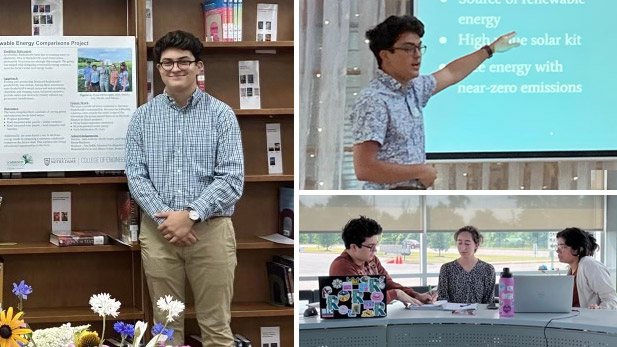Sophomore Alex Lefever’s Summer Internship Brought Renewable Energy to Non-Profit Farm

Originally from Elkhart, Indiana, a sophomore majoring in civil engineering, Alex Lefever participated in University of Notre Dame’s Center for Civic Innovation summer intern program. His internship projects were all designed around improving life for residents of Elkhart.
Alex Lefever, a sophomore majoring in civil engineering, spent his summer working to better the community in which he was raised. Originally from Elkhart, Indiana, Lefever participated in University of Notre Dame’s Center for Civic Innovation summer intern program. His internship projects were all designed around improving life for residents of Elkhart.
Lefever worked with a team of interns to complete several projects, his favorite being renewable energy comparisons, in partnership with Bushelcraft Farm, an Elkhart-based non-profit that provides food, outdoor experiences and educational classes to local residents. Bushelcraft Farm’s land contains no electricity or running water. Lefever’s internship project was to design a renewable energy system to meet Bushelcraft’s energy needs while improving efficiency and increasing sustainability.
Lefever’s group installed a rainwater catchment system on a shed to incorporate rainwater usage at the farm and designed a small solar-powered system. Lefever relied on information he learned in his Global Engineering and the Social Context course he took at Rose last spring, as the class specifically focused on solar-powered pumps and using them as reliable sources of irrigation.
The students also worked on irrigation water retrieval from a small pump on the property that hadn’t been in use for 20 years.
“We rented a generator to test the pump and ended up getting 500 gallons of water for the farm,” said Lefever. “Before that, [the farm workers] would bring a 20-gallon jug over to neighboring farmers market and fill it with water and then drive back to the farm.”
Lefever also worked on a project with the city’s economic development to create a geographic information system (GIS) for Elkhart. A GIS is a type of database that contains geographic data, combined with software tools for managing, analyzing, and visualizing those data. Lefever became an invaluable member of this team project because he took a GIS class during his first year at Rose-Hulman and was able to apply that knowledge to the project. University of Notre Dame students typically take GIS classes starting their sophomore year.
He also worked on a project to help Elkhart High School students physically access internships. Research shows kids from lower income backgrounds have a lower likelihood of getting internship, which is generally caused by transportation issues.
“We explored the barriers, especially physical ones, such as the fact that the high school is next to a busy road without bike lanes,” said Lefever. “If the infrastructure isn’t in place, students can’t make it work.”
The final project Lefever worked on was designing a software program like Google Maps that helps map efficient travel routes for electric-powered recreational vehicles (RV). This project would help companies like Thor Industries, an Elkhart-based company that manufactures RVs. Lefever and his team created math models and talked to professors at University of Notre Dame about electric battery drains to create these maps.
Lefever credits Rose-Hulman for helping prepare him for his internship and being a valuable member of University of Notre Dame’s Center for Civic Innovation summer intern program team.
“Rose, especially my freshman design class and MDS 201, taught me how to think like an engineer, and think analytically in both the human and technical realm,” said Lefever. “I was easily able to apply my technical competence in the area of renewable energies in my internship.”